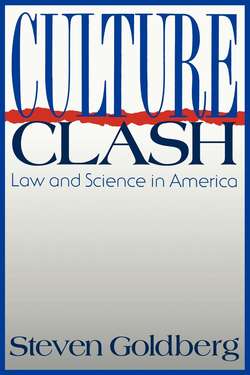Читать книгу Culture Clash - Steven Goldberg H. - Страница 11
На сайте Литреса книга снята с продажи.
Progress in Science
ОглавлениеTo explain the results I encounter when I take my survey, we look not at the intelligence quotient of scientists and lawyers, but rather at the nature of science and law. Scientists are most often thought of as brilliant because science appears unambiguously to make progress. It may be a truism to say that scientists today know more than scientists in the past, but it is a truism with important implications. An assistant professor of biology today may know more about evolution than Darwin. That does not mean the professor is brighter than Darwin, but only that the professor stands on Darwin’s shoulders and on the shoulders of many other scientists. Because science is in this sense cumulative, it is possible to say that a particular scientist has made an important contribution. Scientists achieve this consensus on progress largely by adhering to a standard of testability for evaluating theories. A scientist can come up with a hypothesis about the natural world through any process at all—systematic study, inspired speculation, or fevered dreams. But that hypothesis must ultimately be subject to controlled tests, reproducible by others. A new hypothesis that stands up to testing and explains important matters not previously understood will eventually be accepted by other scientists. Thus, a side effect of this emphasis on progress is an emphasis on priority—the one who first makes a discovery is the one to be rewarded. The result is a community in which outstanding achievement—brilliance—can be agreed upon and honored.4 Brilliance is manifested by doing something no one has done before.
Traditional notions in the philosophy of science demonstrate that the idea of “testability” needs to be clarified. No matter how many times a hypothesis is “verified” by a test, it remains possible that a later test will prove it false. The fact that your car has started everyday does not prove it will start tomorrow. In this sense, science presents us only with theories that fit the available data as best as possible under the circumstances. Those theories may well change as scientists learn more.
What then distinguishes a scientific theory from any other kind? To the philosopher of science Karl Popper it is “not the verifiability but the falsifiability of a system” that is a key criterion of its being scientific.5 Scientific statements are those that can, in principle, be disproved by an experimental result. This is why the vast majority of scientists do not, for example, regard astrology as science:
Astrologers can so hedge their predictions that they are devoid of genuine content. We may be told that a person will “tend to be creative” or “tend to be outgoing,” where the evasiveness of a verb and the fuzziness of adjectives serve to insulate the claim from repudiation. But even if a prediction should be regarded as a failure, astrological devotees can go on believing that the stars rule our destinies; for there is always some item of information, perhaps as to a planet’s location at a long gone time, that may be alleged to have been overlooked.6
Given this approach, it is not surprising that we use the word science primarily when we speak of the natural sciences. The framing of falsifiable hypotheses and the running of controlled experiments is far more difficult, perhaps even impossible, when the subjects are people rather than chemicals or protons. In any event, for purposes of this book, scientists are those seeking cumulative, testable knowledge about natural phenomena. These are people who, when things go right, make progress in their chosen field.
There are important modern scholars who challenge this formulation. To some, all knowledge is contingent and dependent on cultural assumptions—not just the interpretation of a literary text, not just the conclusions of an economist, but even the laboratory results of a scientist.7 But even from this perspective, science ends up appearing a good deal more progress oriented than other fields of human endeavor.
